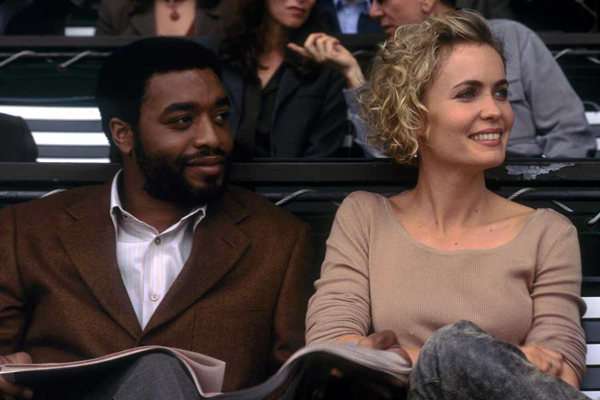Movie review by Greg Carlson
Prolific legend Woody Allen has been fair game of late for releasing a string of films dismissed by critics and ignored by American audiences. Despite a few terrific features (“Deconstructing Harry” and “Sweet and Lowdown” jump to mind), none of Allen’s more recent films have compared to the career achievements of the 1970s and 1980s. Still, one admires Allen for cranking them out at the rate of nearly one per year, and “Melinda and Melinda” is a pleasant enough diversion that shows off a few of Allen’s skillful attributes: colorful casting, exquisite photography and production design, and an almost quaint, old fashioned sense of NYC romance.
Playing out a clever conceit in which two stories featuring the same central character are alternately presented as the faces of tragedy and comedy, “Melinda and Melinda” never ends up going far enough to show just how difficult it is to tell happy and sad apart from one another. It would certainly help if the tragic aspects were poignant and the comic aspects were hilarious, but as it is, “Melinda and Melinda” seems content to show off the considerable skill of Radha Mitchell in the titular role(s). The two-pronged narrative begins with a series of similarities that keeps the audience engaged trying to sort out just how much the stories will have in common (two dentists, two out-of-work actors, two magic lanterns, two dinner parties, etc.).
In both stories, Melinda is an emotional wreck who appears unannounced to insert herself in the lives of some of Allen’s favorite stock types: actors, musicians, and filmmakers. In the tragic thread, Melinda tracks down her old college friend Laurel (Chloe Sevigny), and Laurel’s alcoholic husband Lee (Jonny Lee Miller), convincing them to let her stay at their fabulously appointed apartment. In the comic narrative, Melinda lives in the same building as movie director Susan (Amanda Peet) and Susan’s neglected husband Hobie (Will Ferrell).
Allen makes sure that both Melindas inject plenty of conflict into the lives and marriages of her acquaintances, but the film includes far too few significant revelations or surprises to keep the audience interested beyond the level of curiosity generated by the unique parallelisms of the double story. As an actor, Allen’s own presence is missed, and Will Ferrell’s attempt to play the familiar Woody character meets with mixed results. Only the appearance of Chiwetel Ejiofor, as the elegantly named pianist Ellis Moonsong, injects the proceedings with some overdue sparkle.
The film is so mild mannered, it ends up being neither comedy nor tragedy, and too many of the supporting players are left with little to do. Like all of Allen’s movies, however, the music selections (encompassing the usual array of the director’s favorite pop and jazz standards) are top notch, and greatly contribute to Allen’s fantasy construction of Manhattan. “Melinda and Melinda” lacks the razor sharp bite of Allen’s best writing, and the rapid-fire wit is sorely missed. Allen has balanced the bittersweet happy/sad dynamic more effectively in films like “Annie Hall” and “Crimes and Misdemeanors” – and while those films are great, “Melinda and Melinda” ends up being for hardcore Allen fanatics only.
